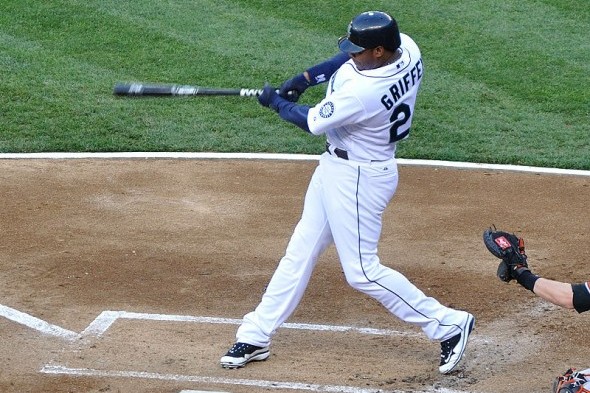
Major League Baseball — specifically, the commissioner’s office — inaugurated the Historic Achievement Award in 1998 to recognize, well, historic achievements. The award is not given out every year, and only 12 have been dispensed. In one of the great baseball ironies ever, three have gone to the Seattle Mariners, one of the most historically underachieving franchises in any sport.
But the Mariners have had their historic moments, and MLB saw fit to recognize a player who had numerous ones in a Seattle uniform. Sunday prior to Game 4 of the World Series, Ken Griffey Jr. received the award in recognition of his astonishing career, which ended with his retirement early in the 2010 season.
Seattle’s No. 1 pick in the 1987 June draft, Griffey guided the Mariners to the franchise’s first two postseason berths in 1995 and 1997, and was the youngest member of the All-Century Team, unveiled in 1999.
With 630 career home runs, the unanimous 1997 American League Most Valuable Player (.304, 56 HR, 147 RBI, 125 R) and future Hall of Famer ranks fifth on the all-time list. Also one of the most popular players of his era, the 10-time Gold Glove-winning center fielder concluded his career with 50,044,176 All-Star votes from fans, most of any player in the history of popular voting. His single-season record for most All-Star votes stood from 1994 until 2011.
“It’s very humbling,” Griffey told MLB.com. “One of the things I said to Bud (Selig) when he told me was, ‘Are you sure?’ and he said yes.'”
In a statement, Selig said, “Ken Griffey Jr. was a gifted all-around player with a perfect swing, a brilliant glove and a childlike joy for the game. From the time he was just 19, Ken represented Major League Baseball with excellence and grace, and he was one of our sport’s greatest ambassadors not only in Seattle and Cincinnati, but also around the world. I am most appreciative for all of Ken’s contributions to our national pastime.”
(Listen to Griffey discussing the award here)
The Mariners are the only major league franchise ever to receive an Historic Achievement Award in recognition of a season, 2001. After losing superstar Alex Rodriguez to free agency after the 2000 campaign, few expected the Mariners to enjoy their best season in team history the following year. But they did.
Buoyed by the remarkable play of the destined-to-be American League Most Valuable Player and AL batting champion Ichiro, the Mariners ran roughshod during the regular season, racking up a record-tying 116 victories while winning the AL West by 14 games over the Oakland A’s.
Ichiro received the club’s second “Historic Achievement” award in 2004 in recognition of his 262 hits that year, which broke George Sisler’s record of 257 in 1920 with the St. Louis Browns. Until Ichiro proved otherwise, many had considered Sisler’s mark to be one of baseball’s unbreakable records.
Noteworthy about Historic Achievement Award, aside from the Mariners (or one of their players) winning it three out of 12 times, is the the fact four of the 12 recipients left baseball in disgrace.
Sammy Sosa received the award in recognition of his 1998 season, when he hit 66 home runs and won the National League Most Valuable Player award. But Sosa left baseball under suspicion after the New York Times reported that Sosa was on a list of players who tested positive for performance-enhancing drugs in 2003.
Roger Clemens won the award for career achievement — six Cy Youngs, 300-plus wins, 4,000 strikeouts, and a 1.90 ERA in seven World Series games. But after Clemens was alleged by the Mitchell Report to have used anabolic steroids late in his career, he infamously denied the allegations allegations under oath before Congress, leading Congress to refer his case to the Justice Department on suspicion of perjury.
On Aug. 19, 2010, a federal grand jury indicted Clemens on six felony counts involving perjury, false statements and obstruction of Congress. Clemens’ trial began on July 13, 2011. The court declared a mistrial on the second day of testimony due to prosecutorial misconduct, but the cloud over Clemens never lifted.
Mark McGwire won the award based on a 1998 season in which he banged 70 home runs for the St. Louis Cardinals, breaking Roger Maris’ record of 60 in 1961. In 2005, McGwire and former teammate Jose Canseco were among 11 players and executives subpoenaed to testify at a congressional hearing on steroids. McGwire refused to discuss his alleged steroid use until 2010, when he finally fessed up, admitting he used steroids “on and off” for a decade.
McGwire’s refusal to talk early, and his late admission of guilt, has — so far — torpedoed his Hall of Fame candidacy. In the 2007, 2008, 2009, 2010 and 2011 balloting for the Baseball Hall of Fame, McGwire failed to attain election, receiving just 128 of the 545 cast (23.5% of the vote) in 2007, 128 of 543 (23.6%) in 2008, 118 of 539 (21.9%) in 2009, 128 of 539 (23.7%) in 2010, and 115 of 581 (19.8%) in 2011.
Barry Bonds also received the award for single-season achievement, his 73 home runs for the San Francisco Giants in 2001, when he also shattered two of Babe Ruth’s records, most walks in a season (177) and highest slugging percentage (.863).
Six years after his 73-homer season, Bonds became a central figure in baseball’s steroids scandals, and was indicted on charges of perjury and obstruction of justice for lying to the grand jury during the government’s investigation of BALCO. Bonds testified that he never knowingly took any illegal steroids, but was convicted on obstruction of justice charges April 13.
Griffey will never join the aforementioned steroid quartet. Never in his career did even a hit of steroid use pass over him, making him the No. 4 home run hitter in history (trailing Hank Aaron, Ruth and Willie Mays) among non-steroid users. His Historic Achievement Award is well deserved.
